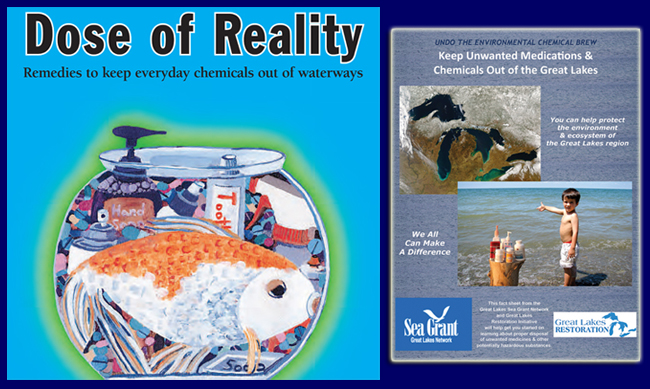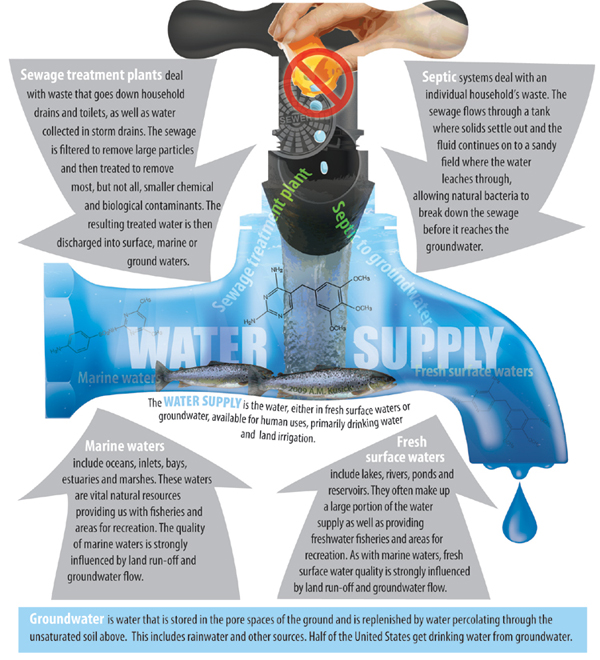Contact:
Helen Domske, NY Sea Grant's Coastal Education Specialist, P: 716.645.3610, E: hmd4@cornell.edu
Buffalo, NY, October 6, 2017 - Twice a year New York residents can take
their unused pharmaceuticals back to collection sites statewide. Why
they should do so is highlighted in the ‘Undo the Environmental Chemical Brew: Keep Unwanted Medications and Chemicals Out of the Great Lakes’ guide developed by New York Sea Grant. The guide is posted online at www.nyseagrant.org/unwantedmeds.
The guide written by New York Sea Grant Coastal Education Specialist Helen Domske,
associate director of the Great Lakes Program at the University of
Buffalo, Buffalo, NY, includes tips on how citizens can keep unwanted
pharmaceuticals and personal care products, also called PPCPs, out of
local waters and out of the Great Lakes system.
"Taking unused prescription drugs to collection sites helps reduce the
impact of unwanted substances on the water resource that provides
drinking water to 42 million people in the United States and Canada and
aquatic habitat for a host of fishes and other wildlife," Domske said.
The Undo the Chemical Brew guide lists 17 different types of PPCPs,
including antibiotics, hormones, contraceptives, antidepressants,
cosmetics, and vitamins, that are finding their way into the Great
Lakes, the source of drinking water for 42 million people in the United
States and Canada.

Research by New York Sea Grant and other science organizations has
tracked the feminization of fish populations downstream from wastewater
treatment plants to estrogen and its components found in prescription
drugs.
"Researchers are increasingly documenting the impact of bioactive
chemical substances in PPCPs throughout the aquatic food web on fishes,
frogs, mussels and other freshwater organisms. We do not want people
flushing unwanted and unused medicines down the toilet or drain," Domske
said.
A New York Sea Grant-funded, two-year research project that began in
February 2016 is examining the effectiveness of advanced water treatment
options, environmental levels and potential effects of pharmaceuticals
in New York waters.
What You Can Do
The biannual National Prescription Drug Take Back Days are an initiative of the U.S. Drug Enforcement Agency in cooperation with law enforcement agencies nationwide. Authorized collection sites are posted online via
the U.S. DEA National Take Back Day Initiative Web site. Collection hours are 10am to 2pm on Saturday, October 28, 2017.
This will be the 14th opportunity in 7 years that the DEC will offer such an event, which helps to ensure the proper disposal of household expired, unused and unwanted prescription drugs.
During this past April's Take-Back Day, Americans turned in 450 tons (900,000 pounds) of prescription drugs at almost 5,500 sites operated by the DEA and more than 4,200 of its state and local law enforcement partners. Overall, in its 13 previous Take Back events, DEA and its partners have taken in over 8.1 million pounds—more than 4,050 tons—of pills.
This initiative addresses a vital public safety and public health issue. Medicines that languish in home cabinets are highly susceptible to diversion, misuse and abuse. Additionally, Americans are now advised that their usual methods for disposing of unused medicines—flushing them down the toilet or throwing them in the trash—both pose potential safety and health hazards.
The U.S Food and Drug Administration offers an online "What You Should Know" guide on the disposal of unused medicines.
In addition to Sea Grant's "Return Unwanted Medicines" resources, our program offers a number of other "Green Tips for Coastal Living."

More Info: New York Sea Grant
New York Sea Grant (NYSG), a cooperative program of Cornell University
and the State University of New York, is one of 33 university-based
programs under the National Sea Grant College Program (NSGCP) of the
National Oceanic and Atmospheric Administration (NOAA). The NSGCP
engages this network of the nation’s top universities in conducting
scientific research, education, training and extension projects designed
to foster science-based decisions about the use and conservation of our
aquatic resources. Through its statewide network of integrated
services, NYSG has been promoting coastal vitality, environmental
sustainability, and citizen awareness about the State’s marine and Great
Lakes resources since 1971.
New York Sea Grant maintains Great Lakes offices at SUNY Buffalo, the
Wayne County Cooperative Extension office in Newark and at SUNY Oswego.
In the State's marine waters, NYSG has offices at Stony Brook University
and Stony Brook Manhattan, in the Hudson Valley through Cooperative
Extension in Kingston and at Brooklyn College.
For updates on Sea Grant activities: www.nyseagrant.org has RSS, Facebook, Twitter, and YouTube links. NYSG produces a monthly e-newsletter, "NOAA Sea Grant's Social Media Review," via its blog, www.nyseagrant.org/blog. Our program also offers a free e-list sign up via www.nyseagrant.org/coastlines for its flagship publication, NY Coastlines/Currents, which is published 1-2 times a year.